Related Research Articles

Khiva is a district-level city of approximately 93,000 people in Khorazm Region, Uzbekistan. According to archaeological data, the city was established around 1500 years ago. It is the former capital of Khwarezmia, the Khanate of Khiva, and the Khorezm People's Soviet Republic. Itchan Kala in Khiva was the first site in Uzbekistan to be inscribed on the World Heritage List (1991). The astronomer, historian and polymath, Al-Biruni was born in either Khiva or the nearby city of Kath.

The State Anthem of the Republic of Uzbekistan uses the same melody as the anthem of the Uzbek Soviet Socialist Republic, composed by Mutal Burhonov in 1947, when the country was a republic of the Soviet Union. After Uzbekistan gained independence from the Soviet Union, new lyrics by Uzbek poet Abdulla Oripov were adopted.
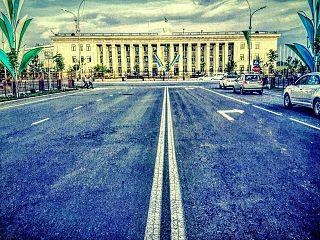
Fergana, or Ferghana, is a district-level city and the capital of Fergana Region in eastern Uzbekistan. Fergana is about 420 km east of Tashkent, about 75 km southwest of Andijan, and less than 20 km from the Kyrgyzstan border. Fergana is becoming one of the main tourist attraction with more night clubs and night life, being the border city to Kyrgyzstan the city attracts more foreigners to the city. The modern city was founded in 1876.
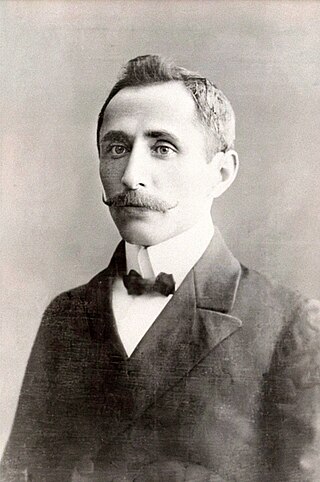
Abdulla Shaig, born Abdulla Mustafa oglu Talibzadeh, was an Azerbaijani writer.
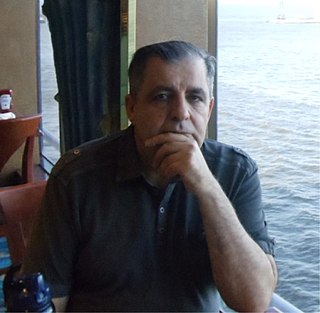
Jahangir Mamatov is a linguist, lexicographer, author, journalist, and a political analyst of Central Asian issues. He is a former member of the Uzbek Parliament and a co-author of Uzbekistan's Declaration of Independence. His writings, tenure in parliament, and other political activities were often greatly at odds with the Uzbek government. He was arrested but escaped into exile for many years. In 2005 he was instrumental in forming the democratic opposition group Congress of Democratic Uzbekistan (CDU) and became its first chairman. His writings are still banned in Uzbekistan.
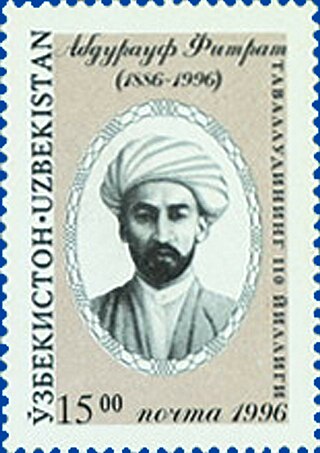
Abdurauf Fitrat was an Uzbek author, journalist, politician and public intellectual in Central Asia under Russian and Soviet rule.
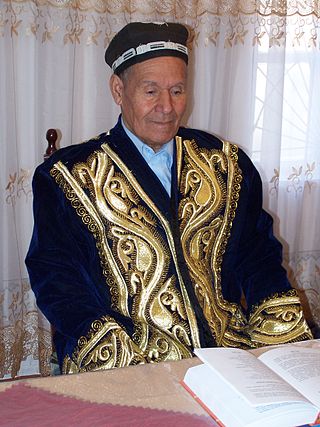
Asad Gulov, also known as Asad Gulzodai Bukhoroyi or Asad Gulzoda was a Tajik poet, linguist and journalist.

Abdulla Qahhor was a Soviet and Uzbek novelist, short story writer, poet, playwright, and literary translator. He is best remembered as the author of the 1951 novel Qoʻshchinor chiroqlari and the 1958 novella Sinchalak.

Abdulla Oripov was an Uzbek poet, literary translator, and a politician. He is best known as the author of the lyrics to the State Anthem of Uzbekistan. In addition to writing his own poetry, Oripov translated the works of many famous foreign poets, such as Alexander Pushkin, Dante Alighieri, Nizami Ganjavi, and Taras Shevchenko, into the Uzbek language.

Erkin Vohidov was an Uzbek poet, playwright, literary translator, and statesman. In addition to writing his own poetry, Vohidov translated the works of many famous foreign poets, such as Aleksandr Tvardovsky, Johann Wolfgang von Goethe, Muhammad Iqbal, Rasul Gamzatov, and Sergey Yesenin into the Uzbek language. Particularly noteworthy are his translations of Yesenin's works and Goethe's Faust.
Uzbekfilm is the largest and oldest film studio in Uzbekistan. It was established on July 1, 1925.
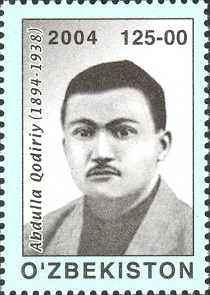
Abdulla Qodiriy, also spelt Abdullah Qodiriy and Abdullah Kadiri in English, was an Uzbek playwright, poet, writer, and literary translator. Qodiriy was one of the most influential Uzbek writers of the 20th century. He introduced realism into Uzbek literature through his historical novels and influenced many other Central Asian novelists.

Quddus Muhammadiy was an Uzbek writer of children's literature, a poet, academic writer, and playwright. He was born to a family of farmers in Tashkent on 25 October 1907. After secondary-agricultural school, he studied at the faculty of biology at the University of Central Asia.
Zhurahon Rahmonberdievich Rahmonov (1917–1977) was the founder of the theater named after Babur Osh, Kyrgyz Soviet film and theater actor. He was an honored artist of the Uzbek SSR (1974).

Abdulla Nigmatovich Aripov is an Uzbek politician who serves as the prime minister of Uzbekistan, in office since 14 December 2016. Aripov is a member of the Uzbekistan Liberal Democratic Party. He was deputy prime minister from 2002 to 2012 and again in 2016.

Bābārahim Mashrab (1653-1711) was a classic figure in Uzbek literature, a poet and thinker, a follower of the Sufi Tarikat tradition, and a dervish of the Sufi order of Nakshbandiyya. His name holds a prominent place in the ranks of such prominent representatives of Uzbek literature as Navoi, Agahi, Mukimi, Furqat, and Zavki. Through his creative works, he exerted significant influence on the development and refinement of Uzbek literature from the late 17th to the early 18th century.
Mirmuhsin Mirsaidov was a Soviet and Uzbek poet and prose writer.

Abdulla Avloniy was one of the representatives of Uzbek national culture at the end of the 19th century and the beginning of the 20th century. He was poet, playwright, journalist, scholar, and public and community leader.

Abdulla Aʼzamovich Aʼzamov is a Soviet and Uzbek doctor of physical and mathematical sciences (1987), professor, member of the Academy of Sciences of Uzbekistan (2013), president of the Uzbek Mathematical Society (2013), vice-president of TWMS (2017). He is the recipient of the "People's Education Hero" medal, the International Babur Award (2015), the "Order of Labor Glory" (2016) and the honorary title of "Scientist of the Republic of Uzbekistan".
Guliston is an Uzbek-language magazine that covers a wide variety of topics, from art and culture to politics and history. It has been described as the "Uzbek Ogonyok" due to the similarity in contents, themes, and popularity. As of 2019 the head editor is Mamatqul Hazratqulov.
References
- 1 2 Salvatore Attardo (25 March 2014). Encyclopedia of Humor Studies. SAGE Publications. p. 475. ISBN 978-1-4833-4617-5 . Retrieved 11 October 2015.